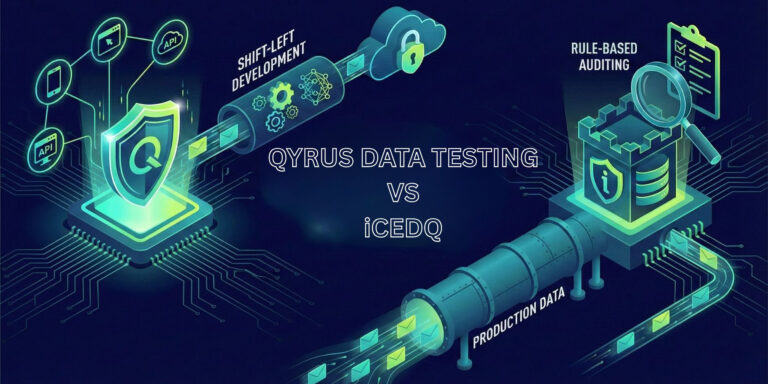4 Qyrus Features That Can Help to Improve Robotic Process Automation

RPA Definition
Robotic Process Automation (RPA) is using technology and AI to mimic back-office human tasks. Through robotic software, RPA is able to perform repetitive tasks to help streamline business activities. RPA emulates human processes and can complete tasks like fill out forms, copy data, put data into new fields, etc. These features can have a range of applications within many different industries that deal with repetitive tasks.
RPA can either be end-to-end automation without human interaction at any step, or it can act as a helper and automate steps that don’t need human intervention. Manual processes like entering repetitive data or code are common places for inefficiency and human error, so utilizing RPA can help reduce errors and make testing more efficient. Why waste human labor on repetitive tasks, when a robot can do it for you?
RPA Example: Banking
In the rise of mobile banking, Robotic Process Automation Technology plays a key part in ensuring that banking features are working as efficiently as possible. Customer experiences are typically a critical part for success in many financial institutions. Users want to access their banking information and use banking features without dealing with setbacks and problems. Financial Institutions are often known for specific regulatory requirements, lengthy manual processes, and setbacks which result in poor customer service and lengthy service times.
RPA can help simplify banking activities and help enhance the overall efficiency for both the user and the business. The customer experience is crucial for any business, so it’s important to put proper RPA technologies in place to enhance accessibly and reduce any problems in relation to customer service.
Many industries, including banking, are adopting RPA tools to automate repetitive, time-consuming tasks, which is allowing many industries to enhance efficiency while reducing overall costs and time. RPA also has applications for other industries like: Manufacturing, Medical, Government, Education, Retail, etc. RPA can help simplify many aspects of business, no matter what industry or department.
What Features Can Help Improve RPA?
Qyrus offers a range of features and AI automation tools that help streamline testing capabilities. Testing is an area of business that is typically time consuming and repetitive, which is the perfect place to utilize RPA. Manual testing takes a lot of resources which can cause delays in the release of new products or processes. Some Qyrus features that utilize RPA include:
- Healer: An advanced AI tool that users can enable before they execute their test scripts. It helps prevent test flakiness and brittleness. Through the use of Healer, testers can say goodbye to the days of scratching their head wondering why their working tests break. If Healer detects a failing test it attempts to remedy the cause and provide the user with feedback as to what went wrong during execution.
- Rover: An autonomous exploratory testing solution using machine learning that is capable of generating tests without any human interaction. Rover can generate test steps, check for crashes, and even ensure reliability of apps.
- Hawkeye: A tool that creates a difference map of Rover explorations for two different versions of an application. Easily comprehend added, changed, or removed screens and transitions across two versions of an application. Testers and developers no longer have try and remember how a process used to function.
- Component Testing: Test business processes across different platforms (web, mobile, API) and applications (internal, external, CRM, finance, etc.) by reusing tests built in other Qyrus Test solutions. Using the component testing feature, testers can create complex and comprehensive tests that cover a wide range of cases and scenarios, all managed from one spot.
Qyrus is an ever-evolving and ever-expanding platform that seeks to continue to push the limits and boundaries of its current testing capabilities. Many more features and solutions exist on the Qyrus platform that lend a hand to RPA and automation as a whole.
Benefits of Robotic Process Automation
These are just a few of the automation and AI features that can help improve RPA. Robotic Process Automation is a stepping stone towards digital transformation. Manual processes, without the help of automation, are typically areas where inefficiency and human error occur.
By utilizing RPA, businesses can improve their capabilities and enhance efficiency so that time is not wasted in the testing phase. Instead, with the freed-up time and resources business can focus on creativity and other important business tasks that actually require human intelligence and decision making. Adopting RPA into everyday business tasks has many other benefits that include:
- Increased Productivity: By automating tedious tasks, Testers can focus on more important business matters because automation can do it quicker and more accurately than humans can.
- Consistency: Through automation, repetitive tasks can be performed consistently every time so businesses can reduce the errors that are typically found in manual testing.
- Reduce Costs: Repeating manual tasks are much more time consuming compared to when they are automated. When a robot is doing these tasks quicker, it gives more time back to employees that can be more productive and creative in other important areas.
- Produce Products Quicker: Tests scripts can be created at an accelerated rate with more accuracy. This means that products or services can be tested quicker and can be released to market much quicker compared to manual testing.
- Reduce Risks: Automation and AI can identify, fix, and change errors without the intervention of a human. Repetitive tasks are typically where errors occur, so when RPA is involved, the errors are reduced and more quality tests are being created at an accelerated rate.
Conclusion
Robotic Process Automation has many benefits and when integrated correctly can greatly enhance overall business efficiency while reducing time and money. RPA is very accessible and has applications for every industry, even the smallest of business. Starting to automate early and utilizing RPA throughout the business process will set them apart from the businesses that ignore automation. RPA is the stepping stone to digital transformation and will greatly help all businesses in the long run.






